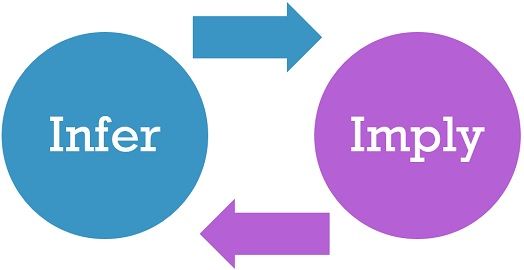 Imply and Infer are the two most confounding words in the English language, which people use synonymously, due to the interconnectivity in their meanings. Nevertheless, they are diametrically opposite terms, as ‘imply‘ means to tell or convey something implicitly, i.e. without directly expressing it.
Imply and Infer are the two most confounding words in the English language, which people use synonymously, due to the interconnectivity in their meanings. Nevertheless, they are diametrically opposite terms, as ‘imply‘ means to tell or convey something implicitly, i.e. without directly expressing it.
On the other hand,’infer‘ means to arrive at a conclusion, considering the facts and evidence resented to you. Let ‘s understand this with an example:
- John’s tone implied that he is very short-tempered, but his schoolmates inferred that he is arrogant.
- Lisa was not in a mood to talk, which implies that she is facing some problem. However, Ron inferred that she is not well.
With these two examples, you might have observed that imply and infer are two exactly different terms. What we imply depends on the verbal and non-verbal signs. On the other hand, what people infer depend on their level of understanding, perception and standpoint.
Content: Imply Vs Infer
Comparison Chart
| Basis for Comparison | Imply | Infer |
|---|---|---|
| Meaning | Imply means to indicate or hint something by means of actions or otherwise, rather than directly stating it. | Infer means to conclude or deduce something by means of the evidences and reasoning, rather than direct statements. |
| Done by | Speaker, writer or doer of the action. | Perceptive listener, reader or the viewer of the action. |
| Party | Sender | Recipient |
| Example | Teacher implied that Aman is very intelligent. | The teacher inferred from Rahul's grades that he is an average student. |
| Recession implies unemployment and poverty. | You can infer from the letter that your mother cares for you a lot. | |
| His outfits implied that he belonged to a well-off family. | Paul inferred that Ani thinks he is a fool. |
Definition of Imply
Imply means to convey a message which can be a feeling, opinion, suggestion or an idea, to the other party, without expressing it outrightly. We use the word imply when the speaker, writer or actor is communicating an indirect message, either verbally or non-verbally. Let’s look at the examples below:
- The change in weather implied more rainfall in the area.
- The increase in the rate of inflation implies that prices of goods and services are likely to rise.
- 20 out of 100 people in the survey are suffering from diabetes which implies that every 5th person is a diabetic.
- If I share my problems with you, it implies you are trustworthy.
- The complaint of students against the teacher, implies they don’t like her.
Definition of Infer
By the term ‘infer’ we mean to make an opinion, assume something as true or arriving at a decision, on the basis of the information, facts, premises and evidence that is available to you. Infer is used when the listener, reader or the viewer is receiving or catching the message sent by the party and drawing conclusions out of it.
- I inferred from the way she was behaving that she’s not in the mood to go for an outing.
- It can be inferred from the incident that the thieves are well known about CCTV cameras.
- From the increase in startups, we can infer that there will be more jobs in future.
- You can infer from the syllabus that the course is vast.
- We inferred from the survey that 60% of students whose age is between 20 to 25, prepare for competitive exams.
Key Differences Between Imply and Infer
The points given below summarizes the difference between imply and infer:
- Imply is a verb which means to indicate something, by suggestion or hint, instead of explicitly saying it. On the contrary, Infer is a verb which means to reach a conclusion or make a logical guess on the basis of the evidence and reasoning, instead of direct statements.
- The implication of the message is done by the person who is being implicit, i.e. the speaker, writer or the doer of the action. As against, Inference is done by the person who grasps the meaning, who can be the listener, reader or the viewer of the action.
- The one who implies is the sender of the message in the process of communication. Conversely, the one who infers is the receiver of the message.
Examples
Imply
- The criticism implied that there are some issues with the research work.
- Stale food to the students implies corruption in the midday meal programme.
- Peter’s consent to the contract, implied by the way he was nodding his head.
Infer
- As the bill is passed by both the houses of the Parliament and received the President’s approval, it can be inferred that it can become a law.
- We can infer from the reports that sales are going to rise in this quarter.
- Increase in employee turnover inferred that there are some issues with the rules and policies of the company.
How to remember the difference
From the above discussion, it may be clear to you that imply and infer are not synonyms, in the sense that while imply means to signify, to indicate or to suggest something, infer means to conclude, to generalise or to surmise something.






Namish says
Yes very good
Ananya V says
Such a great article! Thank you for sharing.
Leigh Wilso says
What a pleasure it is to find such a thorough and accurate explanation.